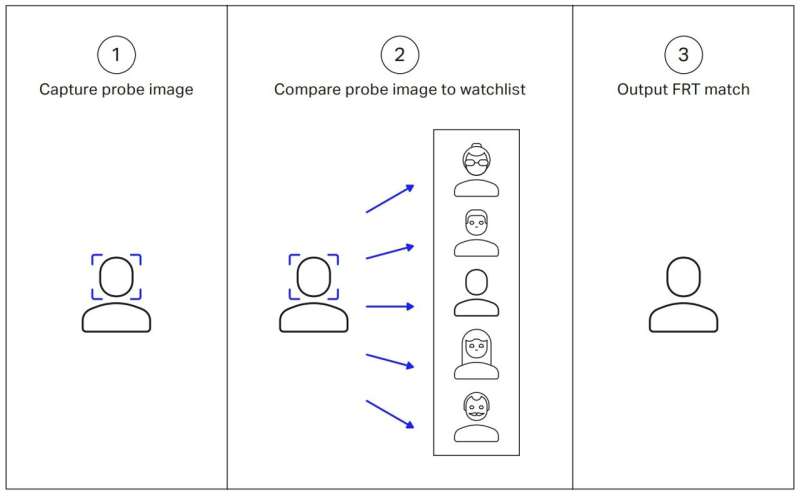
A team from the University of Cambridge’s Minderoo Centre for Technology and Democracy created the new audit tool to evaluate “compliance with the law and national guidance” around issues such as privacy, equality, and freedom of expression and assembly.
Based on the findings, published today in a new report and launched in an online event, the experts are joining calls for a ban on police use of facial recognition in public spaces.
“There is a lack of robust redress mechanisms for individuals and communities harmed by police deployments of the technology,” said the report’s lead author Evani Radiya-Dixit, a visiting fellow at Cambridge’s Minderoo Centre.
“To protect human rights and improve accountability in how technology is used, we must ask what values we want to embed in technology.”
Researchers constructed the audit tool based on current legal guidelines—including the UK’s Data Protection and Equality acts—as well as outcomes from UK court cases and feedback from civil society organizations and the Information Commissioner’s Office.
They applied their ethical and legal standards to three uses of facial recognition technology (FRT) by UK police. One was the Bridges court case, in which a Cardiff-based civil liberties campaigner appealed against South Wales Police’s use of automated FRT to live-scan crowds and compare faces to those on a criminal “watch list.”
The researchers also tested the Metropolitan Police’s trials of similar live FRT use, and a further example from South Wales Police in which officers used FRT apps on their smartphones to scan crowds in order to identify “wanted individuals in real time.”
In all three cases, they found that important information about police use of FRT is “kept from view,” including scant demographic data published on arrests or other outcomes, making it difficult to evaluate whether the tools “perpetuate racial profiling” say researchers.
In addition to lack of transparency, the researchers found little in the way of accountability—with no clear recourse for people or communities negatively affected by police use, or misuse, of the tech. “Police forces are not necessarily answerable or held responsible for harms caused by facial recognition technology,” said Radiya-Dixit.
Some of the FRT uses lacked regular oversight from an independent ethics committee or indeed the public, say the researchers, and did not do enough to ensure there was a reliable “human in the loop” when scanning untold numbers of faces among crowds of thousands while hunting for criminals.
In the South Wales Police’s smartphone app trial, even the “watch list” included images of people innocent under UK law—those previously arrested but not convicted—despite the fact that retention of such images is unlawful.
“Over the last few years, police forces around the world, including in England and Wales, have deployed facial recognition technologies. Our goal was to assess whether these deployments used known practices for the safe and ethical use of these technologies,” said Prof Gina Neff, Executive Director at the Minderoo Centre for Technology and Democracy.
“Building a unique audit system enabled us to examine the issues of privacy, equality, accountability, and oversight that should accompany any use of such technologies by the police.”
Officers are increasingly under-resourced and overburdened, and FRT is seen as a fast, efficient and cheap way to track down persons of interest, say researchers.
At least ten police forces in England and Wales have trialed facial recognition, with trials involving FRT use for operational policing purposes—although different forces use different standards.
Questions of privacy run deep for policing technology that scans and potentially retains vast numbers of facial images without knowledge or consent. Researchers highlight a possible “chilling effect” if FRT leads to a reluctance to exercise fundamental rights—right to protest, for example—among the public, for fear of potential consequences.
Use of FRT also raises discrimination concerns. The researchers point out that, historically, surveillance systems are used to monitor marginalized groups, and recent studies suggest the technology itself contains inherent bias that disproportionately misidentifies women, people of color, and people with disabilities.
Given regulatory gaps and failures to meet minimum standards set out by the new audit toolkit, the researchers write that they support calls for a “ban on police use of facial recognition in publicly accessible spaces.”
UK court says face recognition violates human rights
Report: www.mctd.ac.uk/wp-content/uplo … ion-Report-WEB-1.pdf
Citation:
UK police fail to meet ‘legal and ethical standards’ in use of facial recognition, say experts (2022, October 27)
retrieved 27 October 2022
from https://techxplore.com/news/2022-10-uk-police-legal-ethical-standards.html
This document is subject to copyright. Apart from any fair dealing for the purpose of private study or research, no
part may be reproduced without the written permission. The content is provided for information purposes only.
For all the latest Technology News Click Here
For the latest news and updates, follow us on Google News.
